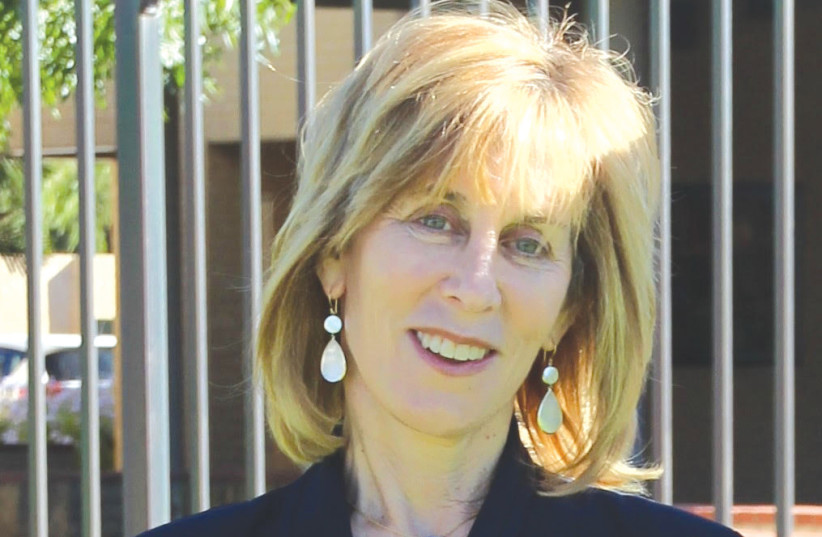When we visited America this Passover, one rabbi introduced the prayer for the sick by blessing COVID survivors and wounded Ukrainians. My son and I exchanged shocked glances. This latest wave of Palestinian terrorism had begun. Yet Israel’s wounded and traumatized remained invisible.
I invite everyone in such somnolent congregations – and throughout the Diaspora – to watch the short, unnerving documentary Closed Circuit, recreating the 2016 attack in Tel Aviv’s Sarona market, recently screened at Docaviv – the Tel Aviv International Documentary Film Festival. Just beware! This 54-minute must-watch movie may shatter your complacency. It’ll be hard to keep sleepwalking past terror victims, who often survive with scarred bodies and souls.
We define terrorist attacks by the numbers killed – and the four Israelis murdered while dining on June 8, 2016, paid the highest price for this evil. Israel nobly protects the privacy of the “merely” wounded, avoiding the gore-porn Palestinians merrily distribute. But this searing documentary introduces us to others – waiters and diners – who remain haunted by those minutes of gunfire six years ago.
Interviewed at Sarona, these brave survivors relive their traumas. As they speak, closed-circuit footage captures the numbingly familiar minutes of diners dining before the shooting – followed by chaos. Closed-circuit TV’s slight distortion, reinforced by the filmmakers’ deft cutaways, shows that memories become hazy over time – yet post-trauma freezes memories forever.

The interviews avoid politicking or moralizing. Yousef Jabarin worked in the kitchen, while Ibrahim Agbaria celebrated a birthday with his wife and kids. Both were terrified as normal people – and embarrassed as Arabs. Yet, afterward, the police first treated all Arab-speakers as suspects. Breaking into Hebrew, Agbaria sums up his identity saying “zeh mesubach”: it’s complicated.
Nevertheless, without speechifying, the filmmakers show that Palestinian terrorists are equal-opportunity killers, often cold-bloodedly targeting fellow Arabs, too. Chillingly, one terrorist pumps a kill shot into a downed body; by contrast, the Israeli police shot a terrorist to stop him, but he survived.
Beyond the TV surveillance system, the powerful title Closed Circuit evokes the open wounds that never close, and the circles of trauma – even a guy picnicking on chocolate-covered pancakes at a safe distance remains rattled.
Watch the movie and see Lihi Ben Ari tear up as she imagines the father-daughter moments she will never share with her dad, who died that night at 42. Watch Hagi Klein refuse to boast about his heroism – he wonders whether he would swing a chair at the terrorists again, given his ongoing hospitalizations after being shot twice. Another survivor, Daniel Salganik, explains that Klein’s actions jammed one terrorist’s gun, saving countless lives. Watch the surreal story of Officer O. – who welcomes into his home, blocks from the scene, a parched, sweating, shaken “survivor” – then realizes the man is dressed exactly as the downed terrorist. And note how everyone divides their lives into before... and after.
One of the film’s producers, Nancy Spielberg, joined the project simply based on a cold call from a film student, Tal Inbar.
“I get many emails pitching projects,” Spielberg told me. “And this was a first film. But it was so sensitive, so careful not to be voyeuristic, that I was hooked. Post-trauma is always there; it’s a constant. It’s interesting to see how people cope with it.”
A frequent visitor to Israel from her New York base, and the visionary behind the now-classic 2014 documentary about American veterans launching Israel’s air force, Above and Beyond, Spielberg reacted viscerally to memories of the Sarona shooting. “That same night, June 8, I was celebrating my birthday in a bustling restaurant, Hatzot, in Jerusalem. So there I was in a parallel universe, eating, enjoying, while 45 minutes away this awful event took place. It’s as close as we ever got....
“Eventually, it wore off. You move on. So making this film was Nancy’s just waking up to what’s going on.”
The film should resonate in today’s America, “where,” Spielberg sighs, “there’s terror in our midst. There’s so much: school shootings and street crime and Tree of Life [Pittsburgh] and Nazis motorcading through downtown LA. Of course, it’s different. In America, it’s one bad apple after another; in Israel, there’s a movement. It’s much harder to stop an ideology.”
Spielberg hopes to start conversations about violence, about post-trauma, helping Americans empathize with the violence Israel faces, while confronting what many Americans now face, too. The film is short enough, accessible enough, that it should be widely viewed in public high schools and on Israel trips, let alone in film festivals and on TV. The material is so rich, so relevant, that an educational guide for the many compelling conversations this film can launch could write itself.
WATCHING THE documentary this week makes it clear: prayers are a start, but they’re not enough. The spring’s terrorist attacks should remind Israelis to keep our government functional; the Knesset cannot afford to paralyze our government, despite ongoing partisan furies. Every voter should repudiate the Netanyahu-led opposition’s refusal to pass the most basic legislation. Treacherous behavior is never justified.
For non-Israelis, this documentary should inspire the 75th-birthday present Israelis deserve from friends worldwide. The Palestinians’ ongoing war against Israel has injured many innocents. Why not adopt one, two, 10, survivors – personally or institutionally? Offer financial and medical support. And, most important, shower them with the love, the gratitude, the psychological buoyancy they deserve, as innocents who were in the wrong place at the wrong time, when Palestinians, riled by their leaders’ intransigence and by anti-Zionist demonizers at home and abroad, lashed out blindly, viciously.
The writer is a distinguished scholar of North American history at McGill University, and the author of nine books on American history and three on Zionism. His book Never Alone: Prison, Politics and My People, coauthored with Natan Sharansky, was published by PublicAffairs of Hachette.
